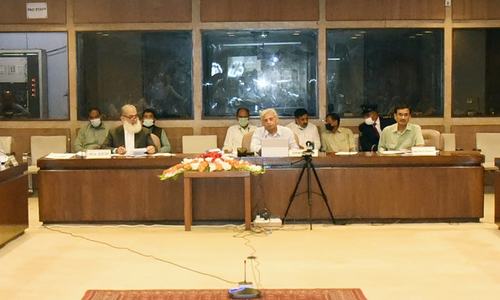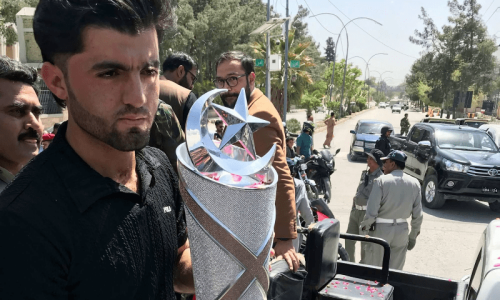• Justice Shah-led bench reserves ruling on pleas against NLC management
• Organisation believes matter needs to be heard by constitutional bench
ISLAMABAD: A question over the jurisdiction of constitutional and regular benches of the Supreme Court emerged on Thursday when the National Logistics Cell of GHQ filed an application after a two-member bench headed by Justice Mansoor Ali Shah reserved its decision on 50 petitions against the NLC management.
According to the applicant, the DG of NLC, Quartermaster General, GHQ, the matter involves constitutional interpretation.
However, the two-member bench overruled the objection of the applicant’s counsel advocate Raja Saifur Rehman.
The bench was hearing the NLC’s appeal against the Federal Service Tribunal’s (FST) decision that bestowed civil servant status to the NLC employees.
Advocate Rehman pointed out that the matter required interpretation of several constitutional provisions. However, the bench overruled the objection and reserved the judgement.
Subsequently, the NLC director general filed an application with the Supreme Court.
It stated that “by way of this application, the petitioner department wants to bring fact into the knowledge of concerned branch that since interpretation of Articles 240, 260 and 212 of the Constitution of Pakistan was involved in these cases; therefore, the cases were to be fixed before the constitutional bench”.
According to the application, the FST wrongly declared the NLC employees as civil servants without taking into consideration Articles 240 and 242.
It went on to state that “it is an admitted fact that substantial question of law as to the interpretation of the constitutional provisions, namely Articles 212, 240, 242 and 260 was required while deciding the CPLAs in order to determine the status of employees as civil servants or otherwise”.
According to the application, “the 50 CPLAs filed by NLC were pending before Supreme Court when the 26th Amendment came into effect. Therefore, Article 191-A (4) is fully applicable”. It added that “as per Article 191-A(4), all the pending appeals before Supreme Court of Pakistan immediately stood transferred to the constitutional bench.”
The application read, “It is therefore requested that on the basis of what has been stated above and keeping in view of 26th Amendment, keeping in view… the settled principles of law, keeping in view the wrong interpretation of Articles 212, 260, 240 and 242 by FST, the final judgement should not be announced and matter be fixed for rehearing before the constitutional bench.”
It may be mentioned that the government has also amended the Supreme Court (Practice and Procedure) Act.
Section 2A of the Act says, “Where a question arises as to whether a cause, matter, petition, appeal or review application falls within Clause 3 of Article 191-A of the Constitution and is to be heard and disposed of by a constitutional bench of another bench, the committee constituted under Clause 4 of Article 191-A of the Constitution shall, through a speaking order, determine the question.”
Published in Dawn, November 15th, 2024














































